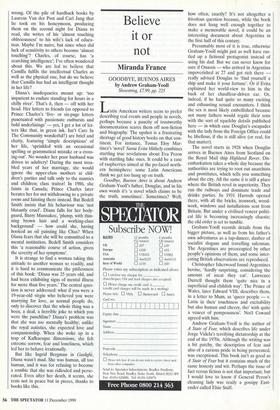Believe it or not
Miranda France
GOODBYE, BUENOS AIRES by Andrew Graham-Yooll Shoestring, £7.99, pp. 225
Latin American writers seem to prefer describing real events and people in novels, perhaps because a paucity of trustworthy documentation scares them off non-fiction and biography. The upshot is a frustrating shortage of good history books on that con- tinent. For instance, Tomas Eloy Mar- tinez's 'novel' Santa Evita blithely combines startling true revelations about Eva Peron with startling fake ones. It could be a case of raspberries aimed at the po-faced north- ern hemisphere: some Latin Americans think we get too hung up on truth.
Goodbye, Buenos Aires is about Andrew Graham-Yooll's father, Douglas, and in his own words it's 'a novel which claims to be the truth, sometimes'. Sometimes? Well,
how often, exactly? It's not altogether a frivolous question because, while the book does not hang well enough together to make a memorable novel, it could be an interesting document about Argentina in the first half of this century.
Presumably most of it is true, otherwise Graham-Yooll might just as well have rus- tled up a fictional protagonist instead of using his dad. But we can never know for sure if Onassis — who arrived in Argentina impoverished at 27 and got rich there — really advised Douglas to 'find yourself a ship and make it your fortune'. Or if Evita explained her world-view to him in the back of her chauffeur-driven car. Or, indeed, if he had quite so many exciting and exhausting sexual encounters. I think the sex is most likely embellished because not many fathers would regale their sons with the sort of squelchy details published here — in which case Douglas's escapades with the lady from the Foreign Office could be libellous, if she is still alive (or real, for that matter).
The novel starts in 1928 when Douglas arrives in Buenos Aires from Scotland on the Royal Mail ship Highland Rover. Dis- embarkation takes a whole day because the authorities are trying to root out anarchists and prostitutes, which tells you something about the city. All the same it is still a place where the British revel in superiority. They run the railways and dominate trade and drinks parties. In 1931 Harrods opened there, with all the bricks, ironwork, wood- work, windows and installations sent from Britain. But under a civilised veneer politi- cal life is becoming increasingly chaotic; the old order is set to tumble.
Graham-Yooll records details from the bigger picture, as well as from his father's own adventures as a tap-dancer, dauber of socialist slogans and travelling salesman. The Argentines are preoccupied by other people's opinions of them, and some inter- esting British observations are reproduced.
Christopher Isherwood found Argentines bovine, 'hardly surprising, considering the amount of meat they eat'. Lawrence Durrell thought them 'quite nice in a superficial and childish way'. The Prince of Wales, later Edward VIII, describes them, in a letter to Mum, as 'queer people — v. Latin in their touchiness and excitability but also human and cheery, tho' with quite a veneer of pompousness'. Noel Coward agreed with him.
Andrew Graham-Yooll is the author of A State of Fear, which describes life under Jorge Videla's terrifying dictatorship at the end of the 1970s. Although the writing was a bit patchy, the description of fear and also of a curious pride in being persecuted, was exceptional. This book isn't as good as A State of Fear but it contains much of the same honesty and wit. Perhaps the issue of fact versus fiction is not that important, but I would love to know if General Peron's cleaning lady was really a gossipy East- ender called Elsie Sniff.


























































































 Previous page
Previous page